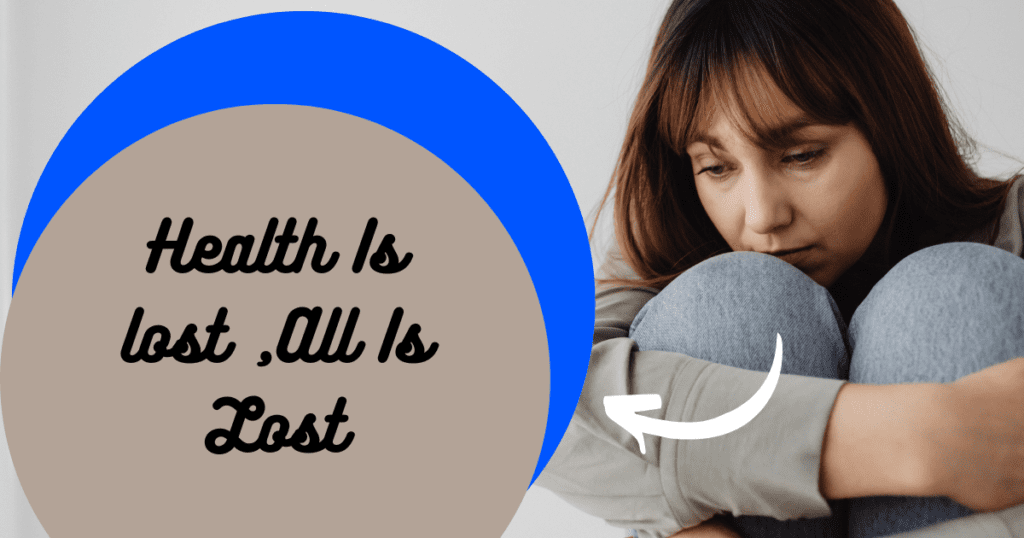“When health is lost, all is lost: Why health is wealth.”
Introduction
“Health is a crucial aspect of our lives, as reflected in the phrase ‘When health is lost, all is lost.’ This highlights the intrinsic value of health, likening it to wealth. Without good health, it is difficult to fully enjoy and appreciate other aspects of life, such as relationships, career accomplishments, and personal goals. Understanding the importance of health is the initial step in valuing and preserving it.”
- “Types and Categories”
Physical Health
“Physical health encompasses the overall well-being and proper functioning of the body’s physical systems. It involves elements such as nutrition, physical activity, and the absence of disease or injury. Good physical health relies on regular exercise, a balanced diet, proper relaxation, and preventative healthcare.”
Social Health
Social health refers to our ability to form satisfying interpersonal relationships and maintain a sense of belonging and connection. It involves communication skills, empathy, and the ability to establish and maintain supportive social networks. Good social health contributes to overall well-being and helps buffer against mental and emotional challenges.
-
Symptoms and Signs
Common Symptoms
Health issues often present with a variety of symptoms, which can range from mild to severe. Common symptoms include fatigue, pain, digestive problems, headaches, and changes in weight or appetite. Recognizing these symptoms early and seeking appropriate care is crucial for preventing more serious health problems.
Uncommon Symptoms
Uncommon symptoms might be more subtle and harder to identify but can be indicative of underlying health issues. These can include persistent mood changes, unexplained changes in behavior, chronic cough, or unusual skin conditions. Being aware of these less obvious symptoms can aid in early diagnosis and treatment.
Causes and Risk Factors
Environmental Factors
Environmental factors such as pollution, access to clean water, and living conditions significantly impact health. Exposure to toxins, poor air quality, and unsafe housing can lead to various health problems, from respiratory issues to chronic diseases.
Lifestyle Factors
“Lifestyle choices play a crucial role in determining overall health. Habits such as smoking, excessive alcohol consumption, poor diet, and physical inactivity can contribute to a range of health issues, including heart disease, cancer, and diabetes. Adopting a healthy lifestyle can help reduce these risks and promote long-term well-being.”
- Diagnosis and Tests
Common Diagnostic Tools
Common diagnostic tools include physical examinations, blood tests, imaging studies (such as X-rays and MRIs), and vital sign measurements. These tools help healthcare providers assess overall health and identify potential problems early.
Specialized Tests
Specialized tests might be necessary for diagnosing specific conditions. These can include genetic testing, biopsies, and specialized imaging studies like PET scans. Such tests provide detailed information that can guide treatment and management plans.
-
Treatment Options
Medical Treatments
Medical treatments encompass medications, surgeries, and other interventions prescribed by healthcare professionals. These treatments aim to manage or cure illnesses and improve patient outcomes.
Therapies
Therapies such as physical therapy, occupational therapy, and psychotherapy play a significant role in treatment plans. These therapies help individuals recover, manage symptoms, and improve their quality of life.
Lifestyle Adjustments
Lifestyle adjustments, including changes in diet, exercise routines, and stress management techniques, are often recommended alongside medical treatments. These adjustments can enhance treatment efficacy and promote overall health.
-
Preventive Measures
Tips and Strategies
Preventive measures are essential for maintaining health and avoiding disease. Strategies include regular health screenings, vaccinations, and adopting healthy habits like regular exercise and a balanced diet.
Health is invaluable, encompassing physical, mental, emotional, and social well-being. Prioritizing preventive measures and healthy habits is essential for long-term well-being.
Healthy Habits
Developing and maintaining healthy habits is key to long-term health. This includes eating a nutritious diet, staying physically active, getting enough sleep, managing stress, and avoiding harmful behaviors like smoking and excessive drinking.
-
Personal Stories or Case Studies
Real-life Stories
Real-life stories provide powerful insights into the impact of health on individuals’ lives. For instance, stories of people overcoming chronic illnesses or making significant lifestyle changes can inspire others to take control of their health.
Impact on Lives
Health issues can profoundly affect all aspects of life, from personal relationships to career and financial stability. Understanding these impacts underscores the importance of prioritizing health and seeking appropriate care when needed.
-
Expert Insights
Medical Professionals’ Advice
Medical professionals offer valuable advice on maintaining health and preventing disease. Their insights, based on scientific research and clinical experience, can guide individuals in making informed health decisions.
Quotes and Insights
Incorporating quotes and insights from experts adds credibility and depth to the discussion on health. These perspectives can highlight important considerations and encourage proactive health management.
Conclusion
Summary of Key Points
In conclusion, health is indeed wealth. Understanding the various dimensions of health—physical, emotional, and social—helps us appreciate its importance. Recognizing symptoms, understanding causes, undergoing appropriate diagnostic tests, and following recommended treatments are essential steps in maintaining health.
Call to Action for Further Education
Prioritizing preventive measures and adopting healthy habits are crucial for long-term well-being. Seeking expert advice and learning from real-life stories can further motivate individuals to take charge of their health. Let’s remember, when health is lost, all is lost—so let’s make health our most treasured wealth.
Health is Wealth
“Health is wealth” is an age-old adage that highlights the importance of good health in one’s life. It means that being healthy is more valuable than any material possession or wealth one might have. This phrase is often used to emphasize the significance of maintaining good health because it can determine one’s overall well-being and happiness.
When we talk about health, we are not just referring to the absence of disease or illness. Good health is a state of physical, mental, and emotional well-being that allows an individual to function optimally in their daily lives. It is a state of being where one has the energy, strength, and endurance to carry out their daily activities, pursue their goals and dreams, and enjoy life to the fullest.
When we are healthy, we can be productive and contribute to society. We can pursue our passions and achieve our goals. We can enjoy our relationships and connect with others. On the other hand, when we lose our health, our ability to do all these things is severely compromised.
Illness or poor health can result in reduced productivity, decreased quality of life, and financial strain. It can limit our ability to work, study, or participate in activities we enjoy. It can also lead to increased healthcare expenses and lost income. In severe cases, it can even lead to disability or premature death.
Therefore, it is important to prioritize our health and well-being. This includes maintaining a balanced diet, engaging in regular physical activity, getting enough rest, managing stress, and seeking medical attention when necessary. By investing in our health, we can lead fulfilling lives and avoid the negative consequences of poor health.



Comments